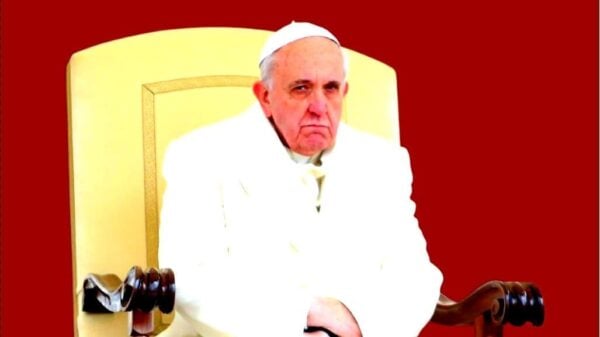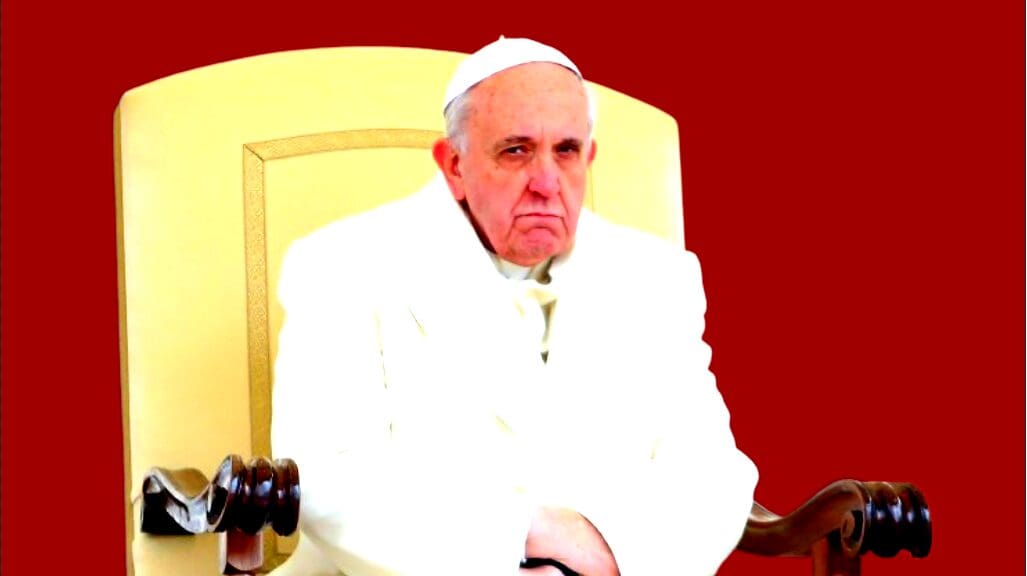
Globalist Pope Francis opened the Church ‘Synod on Synodality’ with a Mass in the Vatican this Wednesday, kick-starting an event that will last the month of October.
Synodality is a way of ‘journeying together’ that ‘calls for speaking and listening to one another and the Holy Spirit’ in order to find a path forward in ‘addressing the issues facing the Church in our day’.
Besides the cardinals and bishops among the 365 ‘members’ with the right to vote at the synod, Francis included about 70 lay people, half of whom are women.
Being who he is, it’s not surprising that Francis is leading this important council in a troubling direction.
A group of influential cardinals is concerned about the development of Catholic doctrine ahead of the upcoming Synod on Synodality.
Back in July, Cardinals Raymond Burke, Walter Brandmüller, Joseph Zen Ze-kiun, Juan Sandoval Íñiguez and Robert Sarah submitted a set of ‘dubia’, formal requests to the pope and the ‘Dicastery for the Doctrine of the Faith’ (the former Office of the Inquisition) for clarification on doctrine.
The New York Post reported:
“The dubia requested clarification on five specific issues the cardinals believe have lacked clarity from the Holy See: the inability to reinterpret divine revelation, the inadmissibility of blessings for same-sex couples, the hierarchical authority of bishops, the ordination of women to the priesthood and the necessity for repentance for sacramental absolution.”
Dubia are typically answered with simple ‘yes or no’ responses – but Pope Francis, always parting with tradition – answered the list of topics in long form in the same month.
The Vatican released the ‘dubia’ answers to the General public Monday. But before the answers were made public, the group of cardinals resubmitted the questions for simple affirmative or negative answers.
The cardinals also published the reformed set of questions in multiple languages for lay Catholics.
“’Brothers and Sisters in Christ, we have manifested our deepest concern to the Roman Pontiff’, said co-signer Cardinal Burke, one of the most prominent Catholic prelates in the US.”
In his answers, Francis walked the church’s doctrinal line, affirming that a ‘marriage’ is an institution ‘distinct to a man and woman receiving the sacrament of matrimony’.
“’The Church has a very clear conception of marriage: an exclusive, stable, and indissoluble union between a man and a woman, naturally open to the begetting of children. It calls this union ‘marriage.’ Other forms of union only realize it ‘in a partial and analogous way and so they cannot be strictly called marriage’, Pope Francis wrote.
The pope left the question of ‘non-marital blessings’ between two people open for debate.
“’Pastoral prudence must adequately discern whether there are forms of blessing, requested by one or more persons, that do not transmit a mistaken conception of marriage’, he said. ‘Because when a blessing is requested, one is expressing a request for help from God, a plea to be able to live better, a trust in a Father who can help us to live better’.”
Many in the church believe Pope Francis is intentionally disseminating ambiguity ahead of this week’s Synod of Bishops.
Cardinals, bishops, priests, religious brothers, nuns and lay people from around the world will discuss ‘the Catholic Church in the modern day’ and how to move forward as a global community.
Conservative Catholics came to distrust the synod’s implications.
Associated Press reported:
“The five cardinals, all of them conservative prelates from Europe, Asia, Africa and the Americas, had challenged Francis to affirm church teaching on gays, women’s ordination, the authority of the pope and other issues in their letter.
[…] The signatories were some of Francis’ most vocal critics, all of them retired and of the more doctrinaire generation of cardinals appointed by St. John Paul II or Pope Benedict XVI.”
Cardinal Brandmueller of Germany is a former Vatican historian. The American Raymond Burke was dismissed by Francis as head of the Vatican supreme court.
Mexican Juan Sandoval is the retired archbishop of Guadalajara, while Robert Sarah of Guinea is the retired head of the Vatican’s liturgy office. Finally, Joseph Zen is the retired archbishop of Hong Kong.
“Francis did respond this time around. The cardinals didn’t publish his reply, but they apparently found it so unsatisfactory that they reformulated their five questions, submitted them to him again and asked him to simply respond with a yes or no. When he didn’t, the cardinals decided to make the texts public and issue a “notification” warning to the faithful.”
Read more about Pope Francis:
The post Pope Francis’ Synod Sees Deep Division, as Globalist Pontiff Hints Possibility of Blessing Gay Couples and Ordering Women as Priests appeared first on The Gateway Pundit.
